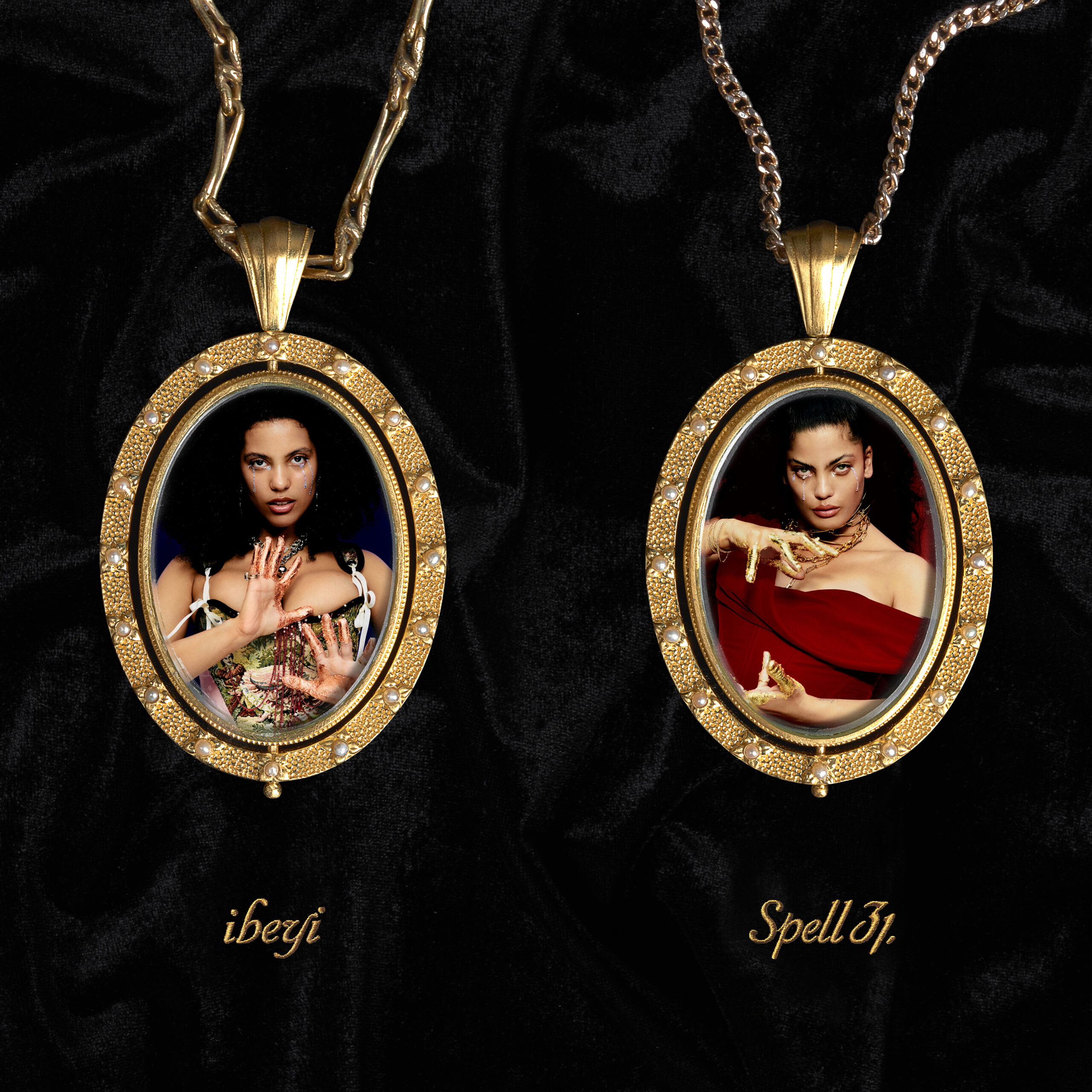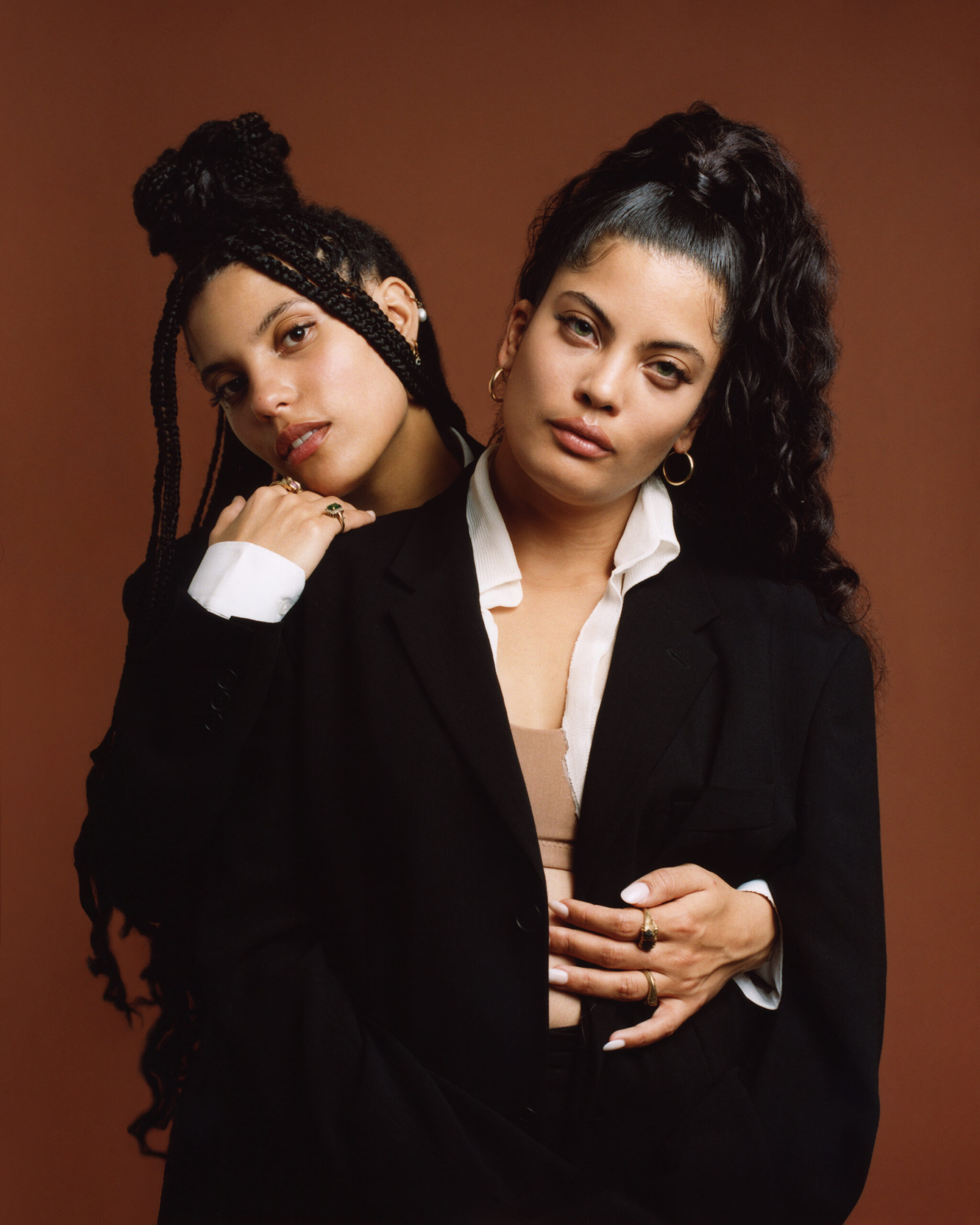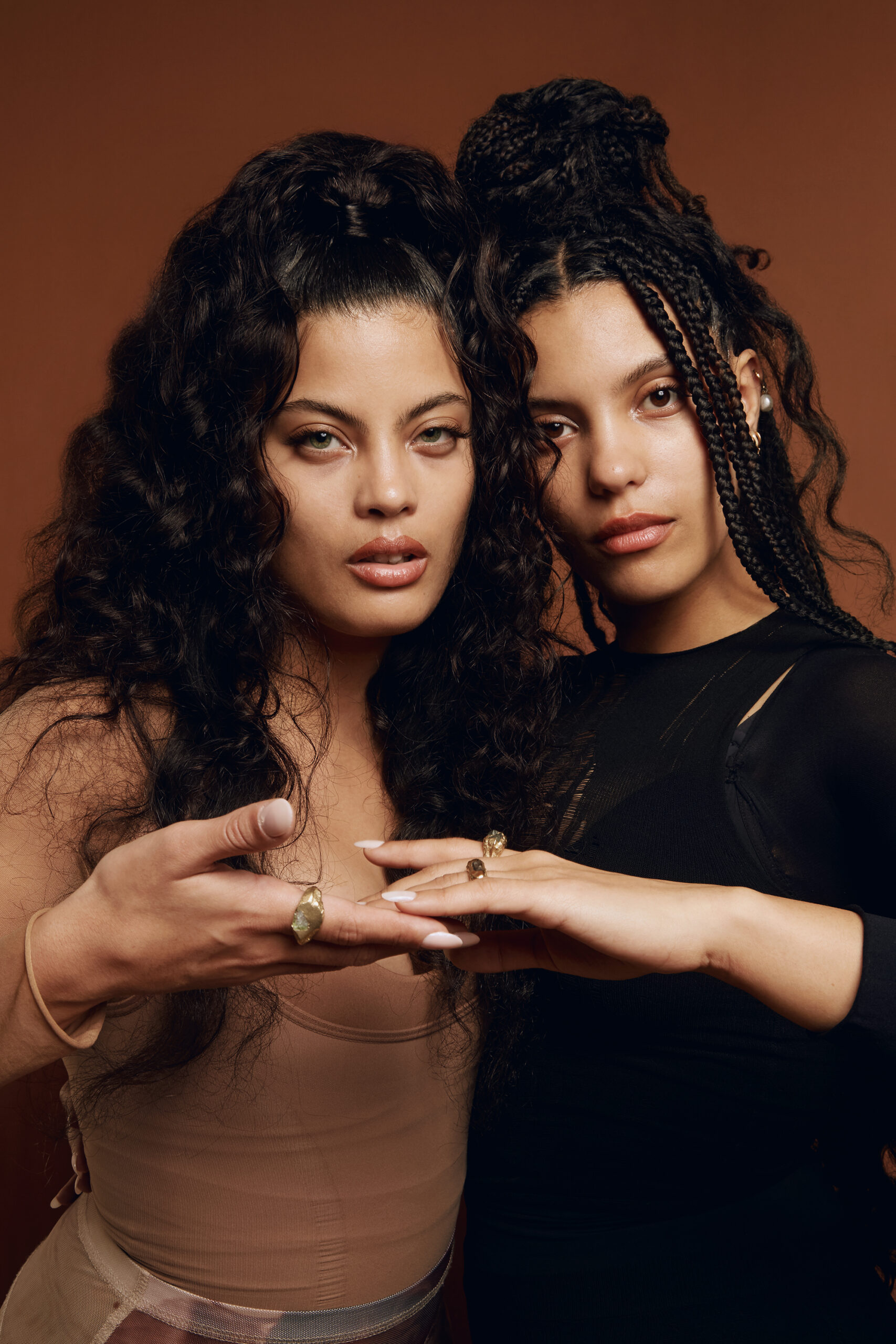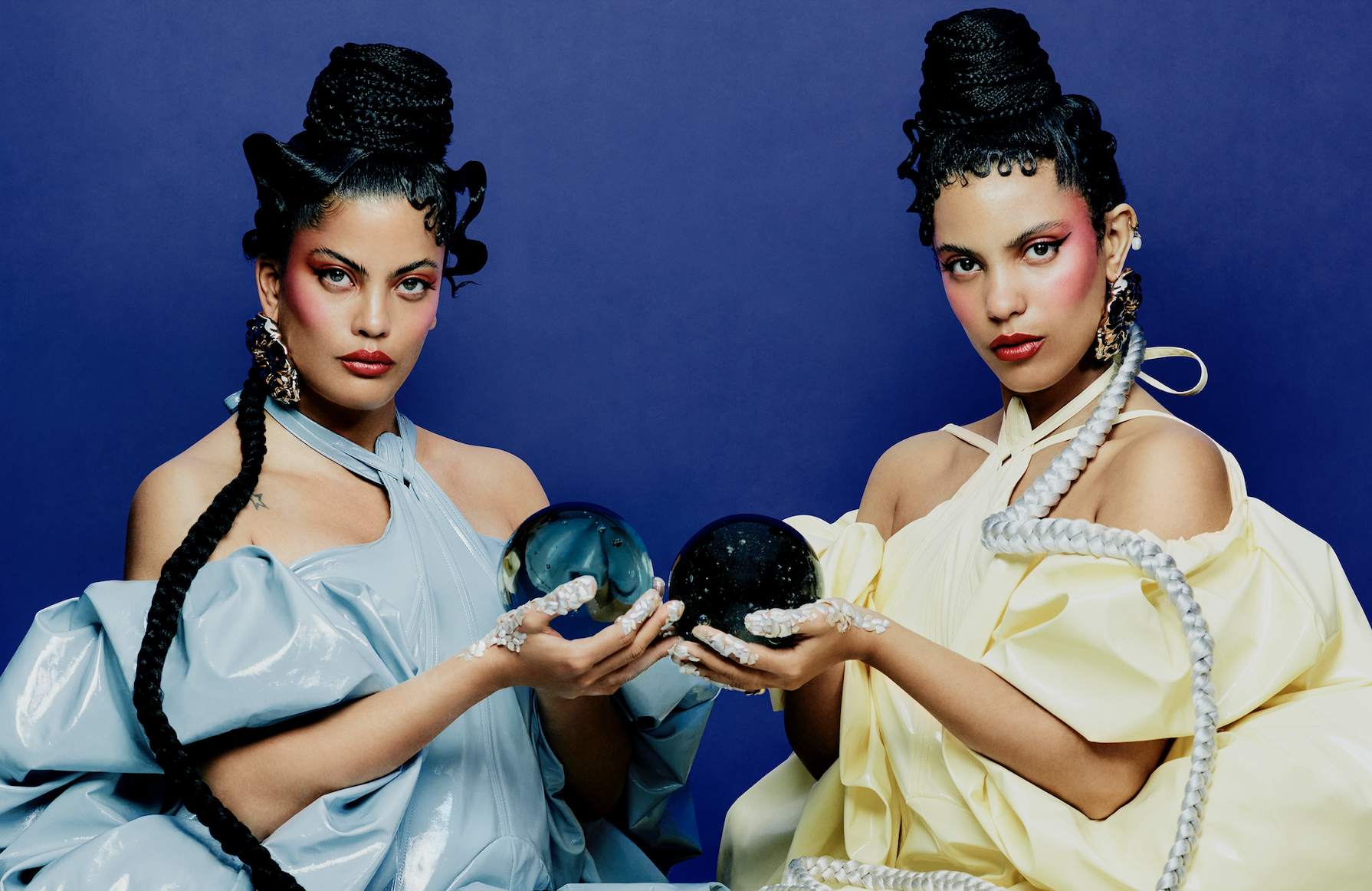 Foto-© Suleika Muller
Foto-© Suleika Muller
Der Sinn des Lebens erschließt sich nur über einen Zauber, der in allem steckt und den man entdecken muss. Finden Lisa-Kaindé und Naomi Díaz, die beiden Zwillingsschwestern aus Paris, die seit 2013 das Duo Ibeyi bilden. Die Töchter des kubanischen Perkussionisten Miguel „Angá“ Díaz haben sich für ihr drittes Album Spell 31 fünf Jahre Zeit gelassen. Erneut hat Richard Russell produziert, der auch das Label XL Recordings leitet. Ein strenger Chef ist er nicht, mehr ein väterlicher Ratgeber. Er hat ihnen die Texte von Black Flags Rise Above vorgelegt, zu dem sich die Schwestern spontan ihren eigenen Sound überlegten. Gastrapper BERWYN machte sich im Angesicht der Gewalt gegen George Floyd seinen Reim drauf.
Militant, verletzlich, zart – Ibeyi sind vieles. Innerhalb kürzester Zeit haben sich mit ihrem spartanisch arrangierten Gemisch aus Electro-Soul, Hip-Hop und ethnischen Versatzstücken (dieses Mal zum Beispiel aus Südafrika) in der Szene und beim Publikum beliebt gemacht. Zu den Fans und musikalischen Begleitern gehören Beyoncé, Adele, Kamasi Washington oder David Byrne, dieses Mal assistierten auch Pa Salieu und Jorja Smith. Wir haben mit Lisa und Naomi über ihren neuesten Schritt gesprochen und erfuhren, wie wichtig ihnen Heilung ist. Sie müsse sein, gerade in Zeiten wie diesen. Wer mag da widersprechen?
We‘re living in a mad time, going from one crisis to another. You‘ve released your debut album in 2015, around the time terror attacks have hit Paris. How do you make music under these circumstances?
Lisa: We think! We make music, we talk about our pain, we talk about our fears how the world is moving. We try to connect, we try to experience beauty despite the ugly things that are around us. Sometimes we also fail in our attempts to feel good, but I have to say when I sing and create I am so present that for a second. I can breathe and I can be calm and there is no anxiety. Some people pray to their God, some people do it when they dance and go clubbing in a sweaty dark underground place, some people do it when they work out. For me it is singing. There are days when I wake up and think: What‘s the point? We‘re all going to die from climate change, we‘re all killing each other, no one is nice to each other, but actually it‘s not true. There are also moments of intense beauty and love right now in the world.
Naomi: I agree. I think healing is important, through all the methods Lisa has mentioned. It can be dancing, it can be cooking, we all need to heal.
Lisa: When we started out in a time of grief in 2015 no one was listening. Oh, those two 18 year olds talking about death! People often didn‘t understand the idea of healing and grieving. Only now after Corona has put everybody in their houses having to face their deepest fear, having to face what was happening not to be able to distract oneself with all the noise and the work and going to a bar, only now they are looking at their own personal lives for real. Suddenly for many it‘s pretty clear that we have to realize the magnitude of healing in this weird and shitty time.
 We had to wait for a new Ibeyi album for five years. What have you done in the period in between?
We had to wait for a new Ibeyi album for five years. What have you done in the period in between?
Naomi: We toured, three years after the first album, two after the second. After that we decided to take time and come back whenever we felt it was the right time. Then Corona started and during our time at home we did the third one.
Initially you‘re sitting in front of a blank sheet. You don‘t know what to do when you start to write. Was it the same in your case or have you been able to work on an idea you had in your mind?
Lisa: That‘s the thing, it‘s not a blank sheet, it‘s more like a puzzle. At the beginning we had loads of pieces, some coming from the puzzle you have right now, some from older ones. We never stopped writing. I came to the studio with a lot of songs. Naomi had beats she had created with producer Richard Russell, she had pieces of her own puzzle. There was stuff in notebooks, stuff we thought about, ideas for visuals and covers too. It was a lot of pieces. Then slowly you dare to try many many things.

The first song on the album is Sangoma. Where did you find the parts for this piece of the puzzle?
Lisa: I wrote it between the end of our tour and before we started recording the new album. I wrote it because I went to a course on race and revolution. In this course I learned about South Africa, about musicians and healers called Sangoma. Sangoma means songlike. The idea of healing though music is an important part of their philosophy, I found that inspiring, how it creates a flow of energy.
84% of people living in South Africa are consulting a Sangoma three times a year. This is showing how deep the connection to these healers is in the country. It‘s interesting you‘re puttting a song on them at the beginning of the record. By going deep into it, do you like to show that you as Ibeyi are more than a superficial pop product of the industry?
Naomi: We don‘t have any problem with the pop thing in general. It‘s not we‘re saying it‘s something we‘re not going to do.
Lisa: But I think if we do pop we‘ll do it our way. I don‘t think we‘ll ever be a product. For us music is about energy and sharing something that comes from deep within. Then it doesn‘t matter what form it takes. We always say that one day we might do a rock album. One day we might do a full hip hop album. One day we might do a pop album. What‘s important is the energy that comes with it.
 How do you combine everything with the elements of your family history? The Cuban, African and French elements?
How do you combine everything with the elements of your family history? The Cuban, African and French elements?
Naomi: The sound we‘re looking for is not the result of a big thought process. If it‘s coming from the Yoruba tradition, it‘s fine. We just let the sound come.
Lisa: I think it‘s organic, it‘s not a recipe. We‘re not going for certain sound elements deliberately, we‘re not saying beforehand that it has to have a Yoruba connection. It‘s more by doing it that we realize where it is taking us. I think that is something Richard Russell has too, that‘s why we mix so well with him. He doesn‘t say, okay what kind of album do you want to make, for this kind of album these are the beats that you need. It‘s not like that. It‘s all a discovery. In the process of making it you have to be brave enough to let go. It‘s also beautiful that in some of the songs it comes through in a subtle way that people would not notice right away. I‘m really proud we‘re not forcing it, that would be disingenuous and awful to me.
O Inle is written in the Yoruba language, Los Muertos in Spanish. Most of the time you sing in English.
Lisa: A lot of people ask us why we sing in English and we‘re French and why there is no French. Actually, in our process of making music we‘re really French. In the idea that the melody and the lyrics should be really strong, in the way the intonation works in our melodies. Also that fact we‘re part of a mixed culture in France is something that is important, the fact that we‘ve grown up in Paris. I often wonder how different our music would be if we had grown up in Cuba. There is not just one thing in our music, that quality makes it singular maybe.
Los Muertos is dedicated to your father and to Roy Hargrove and Prince. The way you celebrate them reminds me of the way the deceased are seen in countries such as Mexico where people are defiant and think that death is not the end.
Naomi: We have a special connection to death because we encountered death at a young age. Our dad died when I was 11, my sister when I was 18. When you experience death while you are young, you see death differently than other people. There‘s not a good or bad way to see it, everybody has their belief and we have to accept that.
Lisa: We are influenced by Mexican art, especially by Frida Kahlo. She has inspired us in many ways in this new chapter of Ibeyi. Made Of Gold is based on a Frida Kahlo painting and in Sister 2 Sister we are alluding to the two Fridas. It‘s interesting how people in Latin Amercia view it, how human beings leave the world physically. It‘s not based on realism, it‘s something they feel. I like it.

Tell me what kind of feeling went into the writing of the song Rise Above. It‘s based on an interpretation of the song by Black Flag.
Naomi: We‘ve never heard the song. Richard had written the lyrics on a paper. He said just have a look at the lyrics, and then we jammed with the lyrics. We did it in ten minutes, it was really magical. The song can have an impact on people, on minorities, women, people who don‘t feel well represented or treated. That‘s how BERWYN sees it too who is rapping on the song. He felt it had a certain meaning for him after what happened to George Floyd. But in general the song is not for certain groups of people, it‘s for everybody.
Lisa: We‘re going to make you sing it while we‘re on tour. We make you scream the words rise above over and over again. There is lot of bad stuff happening at the moment, we need to rise above it. Naomi and I needed that kind of song, it‘s our own little revolution.
Politics in pop as a topic – a good idea?
Lisa: This is sooooo interesting! I think if you‘re not ready to talk about it, don‘t do it. You‘re going to make more harm than good. I think artists are at their best when what they talk about comes from their GUTS. It doesn‘t have to be politics, but it can be politics. It just depends on what kind of artist you are. You can‘t ask someone, who just wants to make you dream in a small sweaty club, to talk about something he or she isn‘t sure of.
Naomi: Even though some people talk about politics, they shouldn‘t be asked to talk about it all the time, only if they want to. Like Lisa said, there are artists who make people dream. But you don‘t make people dream when you talk about politics. You really have to be comfortable. On this earth we all have to create a little piece individually that makes people feel good. If you don‘t do it with politics, if you just want to heal, it‘s amazing, you‘re doing your job.
Lisa: Also I want to say something about this in the most loving way. I feel so much is being put on artists, we‘re supposed to heal everybody, to be super political, to show you how we are and how we live, to give recommendations how to lead your life. But we‘re not saviours! We‘re not prophets! We are so lost like you are. We are just here to mirror you. I‘m no God – I‘M REALLY NOT!!!! How often do I wake up and think: How am I going through this day? We talk about it when we feel that this is something that pains us. But I can‘t save anyone and I don‘t think Naomi can save anyone either. But what I can do is talk about it, trying to heal and make sense of it through music. Hopefully it will allow you to do the same. It might just be a spark of an idea, a spark of a feeling, and you‘ll do something with it. This to me would be a huge result.
Ibeyi Tour:
09.11.22 Berlin, Metropol
10.11.22 Hamburg, Uebel & Gefährlich










